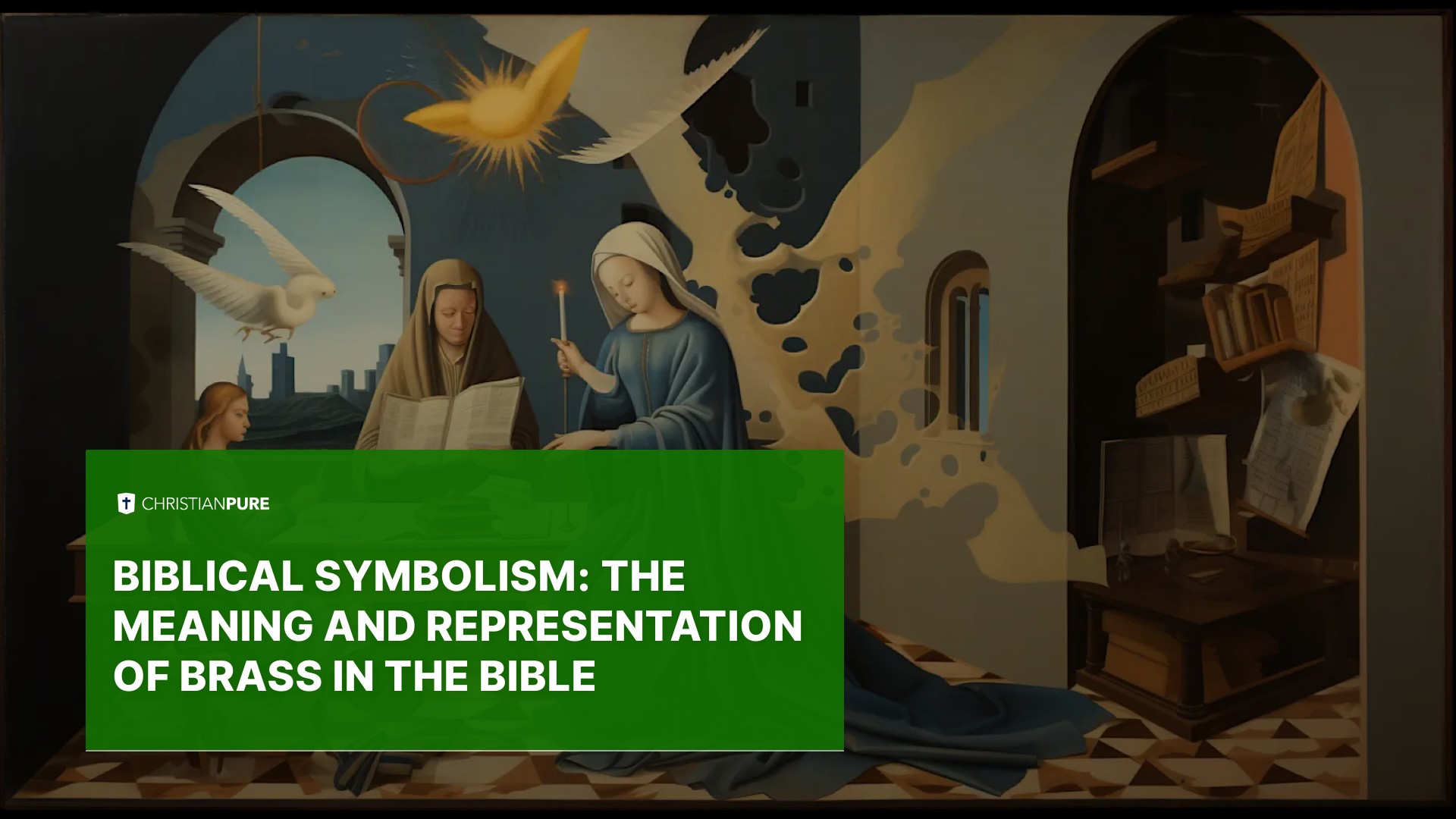Definition of brass in the Bible
As we delve into the labyrinthine lexicon of biblical symbolism, we find brass is an alloy that assumes a significant role in the sacred narratives. The Hebrew word 'nehosheth' forms the basis for the term 'brass' in biblical times, and it refers to compound of copper or bronze, owing to the absence of zinc required to produce brass.
Reflected in Exodus 27:2, we witness brass emerging as a material symbolic of God's righteous and severe judgment. 'You shall make its horns on its four corners; its horns shall be of one piece with it, and you shall overlay it with brass.' This passage speaks to brass as materials of the altar of burnt offerings, signalling divine judgement against sin.
The properties of brass, strength and durability, shower additional light on its biblical symbolism. Such robust nature resonates with the steadfastness of God's judgement, firm and unbending against transgressions. When we consider brass in Leviticus 26:19, we discover a reflection of divine judgement cast upon land for the sins of its inhabitants: "I will break the pride of your power; I will make your heavens like iron and your earth like brass."
In another dimension, the brass instruments in biblical times were pivotal in praise and worship, converting the physical properties of brass into a spiritual context of resounding joy and expressions of faith.
To summarize:
- Brass in the Bible represents God's righteous and severe judgement against sin.
- The material nature of brass – strength and durability – convey the unyielding nature of divine judgement.
- Brass instruments were a crucial component of praise and worship rituals in biblical narratives.
- The term 'brass' as it appears in biblical texts should be understood as copper or bronze, owing to metallurgical limitations of the era.
What does the bible say about brass?
In the complex world of biblical imagery, brass primarily symbolizes strength, resilience, and judgment. Think deeply and reflect upon Leviticus 26:19, where the Bible uses brass to denote the divine judgment of God upon the land due to the sins of its inhabitants. How might this resonate with us today?
When we delve into the Biblical narrative of the Tabernacle, we find brass in key roles. The altar of burnt offerings and the laver, both crucial articles, were crafted from this durable alloy. Brass, in these contexts, becomes a material testament to humanity's enduring relationship with God, and the divine judgment that can result from sin.
In the realms of praise and worship within the scripture, we see mention of brass instruments. This not only underlines the strength and durability associated with brass, but also invites us to connect it with the joyful noise of dedication to the Almighty.
Brass also serves to symbolize the cleansing, fiery judgment, and purification from God - an echo to the metallurgical process of brass itself. This ardent connection underlines one of the Bible's most persistent themes: the refinement and testing of the faithful through trials.
In conclusion, through multiple Biblical narratives, brass shines forth as a symbol of strength, judgment, growth, and refinement. As we ponder upon these interpretative layers, does the symbolism of brass bear a new light for you? Can you see its shine in your understanding of the holy scripture?
To summarize:
- Brass symbolizes strength, resilience, and judgment in the Bibical context.
- God's divine judgment due to human sin is reflected through the symbol of brass, as mentioned in Leviticus 26:19.
- Brass' presence in the Tabernacle, specifically in the altar of burnt offerings and the laver, highlights its significance in the human-divine relationship.
- Brass instruments signify joy and dedication towards God, denoting the lighter aspect of this symbol.
- The biblical symbol of brass also emphasizes the theme of purification and refinement of the faithful through trials and tribulations.
What is the Catholic Church's stance on the symbolism of brass?
In the Catholic Church, the symbolism of brass carries significant spiritual weight. As we journey through the pages of the Holy Scripture, we often encounter brass objects reflecting a divine characteristic, specifically divine judgment against sin.
Biblical testament often shows God using brass as a metaphor for His strength and conviction, helping His followers understand His divine wrath against transgression. The enduring strength and resilience of brass, seen in its metallurgic properties, mirror the unyielding nature of divine judgment. But just as brass, through fire, can be purified, so too can our spirits be cleansed through divine judgment and repentance.
It is also fascinating to note that brass is often depicted in the context of war and consecration. Artifacts made from brass, once taken during war, are typically consecrated to God—another showing of the Church's regard for brass as symbolically tied to the divine.
Understanding this figurative representation of brass helps deepen our appreciation of biblical messages and adds layers of meaning to our faith journey. Is it not beautiful how the divine communicates through such worldly items, encapsulating spiritual truths within the tangible?
To summarize:
- The Catholic Church perceives brass as a divine symbol, primarily representing divine judgment against sin.
- The strength and resilience of brass mirror the steadfastness of divine judgment.
- Brass objects captured during war were often consecrated to God, underscoring the sacrosanct essence of brass according to the Church.
- Recognizing the symbolism of brass helps us to express our faith more deeply and comprehend the multifaceted nuances of the Bible's messages.
Why is brass used as a symbol in biblical texts?
Indeed, we might ask ourselves, why does brass carry such significant symbolic weight in the Bible? This common, yet durable alloy has a powerful symbolism associated with strength, endurance, and judgment. It is a metaphor found in multiple instances throughout the Scriptures. But why is that so?
The simplest answer is that brass, with its inherent strength and resilience, exemplifies the enduring power and steadfastness of God's presence amongst His people. This strong, enduring nature is why brass was used in the construction of important religious landmarks and items - the brazen altar, the pillars, the laver, and the gates of the Tabernacle and the Temple.
In the Tabernacle, for example, the brazen altar was where animals were sacrificed as offerings to God—signifying atonement for sins. Thus, the use of brass in such a context draws on its symbolic representation of divine judgement against sin.
Furthermore, this divine nature manifests itself in the praise and worship of the Lord -- when brass instruments are raised in joyful exultation. As we turn the pages of the Bible, the timbre of brass resonates in our hearts, reminding us of the enduring strength and judgment of the Divine Creator.
Conclusively, the symbolism of brass in the Bible is multifaceted. From symbolizing the divine nature of God and His holy judgment, to underscoring the endurance of His presence, the Bible uses brass as a tangible illustration of the divine attributes that form the foundation of our spiritual journey.
To summarize:
- Brass is used in the Bible as a symbol of the strength, endurance, and judgment of God's presence amongst His people.
- The use of brass in the construction of religious items and landmarks, such as the brazen altar, the pillars, the laver, and the gates of the Tabernacle and the Temple, emphasizes this symbolism.
- Brass also symbolizes divine judgement against sin, as illustrated in the context of the brazen altar in the Tabernacle where animals were offered as atonement for sins.
- Moreover, brass instruments used in praise and worship further reinforce the symbolism of brass as a reflection of God's divine nature.
- The symbolic role of brass in the Bible underscores the divine attributes that form the core of our spiritual lives.
How does the biblical interpretation of brass vary between different Christian denominations?
Interpretations of the biblical symbolism of brass can differ significantly among various Christian denominations, reflecting their distinctive doctrines and beliefs. Most often, however, they all agree on the intrinsic qualities attributed to brass: strength, durability, and judgment.
For many Protestant churches, the implications of brass in the Bible often turn towards its symbolic representation of judgement and righteousness, as derived from scriptures like Exodus 27:2. The belief is that, much like the altar of burnt offerings constructed of brass, the divine judgement of God is relentless, purifying, and transformative.
In contrast, Catholic and Orthodox churches tend to emphasize the allegorical nature of brass as a reflection of divine nature. This interpretation gleans its inspiration from the usage of brass across various Biblical narratives like the use of the brass serpent in the Book of Numbers. It serves as a symbol of God's power to heal and restore, showcasing both His justice and mercy.
Pentecostal and Charismatic churches, with their emphasis on praise and worship, often view brass (especially in the form of brass instruments) as a symbol of joyful worship and exultation before God. The role of brass instruments in the Biblical praise reflects the believer's jubilant communion with the Divine.
Despite these differences, across the Christian spectrum, the underlying attributes of brass as symbolizing strength and endurance are universally recognized and appreciated. These interpretations, mixed with the physical properties of this alloy, create a multifaceted, powerful image that spiritually enriches Christian believers.
To summarize:
- Protestant churches often view brass in the Bible symbolizinig stern justice and righteousness.
- Catholic and Orthodox churches consider brass as a reflection of God's divine nature, encompassing both His justice and mercy.
- In Pentecostal and Charismatic circles, brass, particularly brass instruments, are used to symbolize joyful worship and exultation.
- Across all denominations, brass conjures imagery of strength, durability, and divine judgment.
Does the symbolism of brass change throughout the Bible?
Throughout the biblical narrative, the symbolism of brass does indeed shift, reflecting the changing circumstances, events, and spiritual lessons within the stories. However, the core aspects of brass as a symbol of strength, resilience, and divine judgment remain constant. This constancy might be compared to the unwavering nature of God's character, even as His interactions with humanity evolve.
Consider the altar of burnt offerings in the Tabernacle, overlaid with brass. It was here that animal sacrifices were made, signifying the payment and atonement for sin—an act demonstrating both divine judgment and the tenacious strength of God’s mercy. Similarly, the laver, also made of brass, was used by priests for ritual cleansing—another representation of God's relentless pursuit of purity and righteousness.
In contrast, brass instruments used in praise and worship play a significantly different role, signaling joyous celebration and thanksgiving, underscoring the strength and durability of communal faith. The resonance of brass instruments does more than create a harmonious melody; it symbolises the strong, enduring nature of our collective relationship with the divine.
We even glimpse brass in prophetic visions within the Books of Daniel and Revelation, where it can denote both strength and divine judgment. Such textural and interpretative variances only serve to deepen our understanding of this multifaceted symbol.
So, does the symbolism of brass change throughout the Bible? Yes, it evolves subtly just as the narrative and covenantal relationship between God and humanity does. But it’s the consistency in its core symbolism that so beautifully echoes the steadfast love and judgment of God.
To summarize:
- Brass symbolism in the Bible shifts subtly but maintains its core signification of strength, resilience, and divine judgment.
- Instances of brass in the Bible—like the altar and the laver—symbolize judgment and atonement, while brass instruments represent communal faith and celebration.
- Prophetic visions using brass imagery underscore the themes of divine strength and judgment.
- The consistency of brass's core symbolism reflects the steadfast nature of God's love and judgment.
What connections might exist between the biblical symbolism of brass and its physical properties?
In the Bible's sacred narrative, the symbolic nature of brass, as with many things, doesn't occur by chance or accident. By delving into the inherent properties of brass, we can glean divine truths and powerful spiritual messages. We invite you, dear reader, to embark on this journey with us, as we explore the tangible and spiritual intersection of this illustrious metal.
Physically, brass is both strong and durable, known for its longevity and resistance to corrosion. Isn't this, brethren, a fitting parallel to the immutable nature of divine judgment, immaculate in its ultimate fairness? When God passes judgement, as He did numerous times throughout the Bible, it stands steadfast and enduring, much like brass.
Isn't it also interesting to note that brass, as an alloy of copper and zinc, reflects the concept of unity in diversity? It is a harmonious blend of two elements, each retaining its unique properties yet working in synergy to create something stronger. This can well be viewed as a metaphor for the body of believers, all distinct yet unified in Jesus Christ.
The warmth of brass, too, speaks to us. Its golden hue, akin to the glow of fire, serves to remind us of God's purifying presence. Fire, across many passages in the Bible, is symbolic of God's refining process, a searing judgement meant to purge impurities and elevate humanity to a state of divine nature. Thus, the same can be said for brass, its lustrous sheen a perpetual reminder of this spiritual purification.
In the construction of sacred biblical fixtures such as the Tabernacle and the Temple, brass was preferred for its combination of strength, durability, and beauty. The pillars, gates, altar—all these enduring objects of brass—are manifestations of God's unfailing presence, His divine strength that weathers all trials and tribulations. Truly, the symbolism of brass in the Bible is a compelling study of the divine interplay between the physical and the spiritual.
To summarize:
- Brass, by virtue of its durability and strength, symbolizes the enduring nature of divine judgement and God’s unfailing presence.
- The creation of brass as an alloy reminds us of the unity of the body of believers in Christ, each retaining their distinct properties yet forming something stronger together.
- The warm, golden hue of brass is symbolic of God's fiery judgement and purification process.
- Brass, used extensively in constructing sacred biblical fixtures, signifies the undying presence of God and His divine strength.
Is there a connection between the biblical symbolism of brass and the brass serpent mentioned in the Book of Numbers?
In the Book of Numbers, a pivotal episode marked by the introduction of a brass serpent provides an illuminating example of the symbolic weight that brass carries within the biblical narrative. As we delve into the story, where the Israelites were plagued by fiery serpents due to their continued rebellion against God, we find an imagery that unfolds before us. These serpents, their bites lethal and their presence terrifying, represented the divine judgment inflicted upon the Israelites for their sins.
As the chastisement became unbearable, the Israelites repented and sought Moses' intercession. Here, God commanded Moses to fabricate a serpent made of brass and elevate it on a pole - anyone bitten, upon looking at this serpent of brass, would live (Numbers 21:9). The brass serpent became a symbol of healing and salvation, showcasing brass as a material correlating with transformative and redemptive power Incarnate in Jesus Christ on the Cross. Just as those who looked upon the serpent of brass were saved, so too are those who turn their gazes towards Jesus Christ on the Cross, who took upon Himself the divine judgment for humanity’s sins.
The symbolism of brass in the Bible, especially as it pertains to this brass serpent, highlights its relation to strength, endurance, and divine judgment. Brass, a durable and enduring material, mirrors the potency and permanence of divine judgment. Yet, simultaneously, it portrays a hopeful picture of deliverance and salvation that arises from this judgment, allowing the narrative to illuminate the mercy entrenched within divine judgment. So, the Bible effectively creates a rich link between the symbolism of brass and the brass serpent in the Book of Numbers, showing us how deeply meaningful and multidimensional the biblical symbolism of brass truly is.
To summarize:
- The brass serpent mentioned in Numbers 21:9 carries the symbolic meaning associated with brass in the Bible, representing divine judgment, healing, and salvation.
- Brass is portrayed as a material that signifies durability and strength, reflecting the endurance of divine judgment and the transformative power of divine mercy.
- The narrative involving the brass serpent essentially manifests God's judgment while simultaneously offers a message of redemption and salvation, resonating the multi-layered symbolism of brass in biblical texts.
Does the symbolism of brass in the Bible have any relevance to modern day Christianity?
In these present times, the symbolism of brass in the Bible maintains pertinent relevance to modern day Christianity, threading a line of continuity from the ancient past to the present day.
Brass, as we've already discovered, holds significant symbolism of strength and durability. Just like brass, Christian faith illuminates the strength and endurance required in the face of life's trials and challenges. It speaks volumes about the commitment of Christians to hold fast in the faith even in tempestuous times. Similarly, in our current age, the call endures for Christians to display the strength of their faith and the commitment to their spiritual walk in the likeness of brass - unyielding and robust.
Moreover, the association of brass with divine judgement and fiery purification aligns with a central teaching of Christian faith. In theological spheres, the concept of sanctification - the process of becoming more like Jesus Christ - involves a measure of divine judgement and purification, akin to the refining of brass under the smith's hammer. Thus, the imagery and symbolism of brass continue to resonate in the Christian discourse on personal and moral transformation.
Numerous hymns and contemporary Christian music also draw on the brass symbolism, emphasizing the use of brass instruments in praise and worship. These melodic expressions extend the act of adoration and joyful acknowledgement of the divine nature of God.
It is captivating to realize how an element such as brass, used in the ancient construction of the Tabernacle, continues to shape and inspire the Christian narrative in the contemporary world. For the believers today, aren't we walking the same spiritual path our predecessors embarked on, fortified by the same divine strength, shaped by the same divine hand, and guided by the same divine light?
To summarize:
- The symbolism of brass as indicative of strength and durability reflects Christian faith's enduring resilience and steadfastness.
- The correlation between brass and divine judgement accentuates the Christian belief in sanctification and moral transformation.
- Brass instruments in Christian music and worship echo the biblical use of brass and strengthen the connection between ancient tradition and modern religious practice.
- The symbolism of brass continues to resonate with modern day Christianity, demonstrating a continuity from biblical times to the present era.
Facts & Stats
Brass is mentioned approximately 130 times in the King James Version of the Bible
In the book of Exodus, brass is mentioned 50 times
The book of Numbers mentions brass 21 times
Brass is mentioned 32 times in the book of Leviticus
In the book of Revelation, brass is mentioned only once
In the book of Ezekiel, brass is mentioned 27 times
The book of 1 Kings mentions brass 23 times
In the Book of Revelation, the feet of the angel are described as being like polished brass
In the Book of Deuteronomy, the gates of the Promised Land are described as being made of brass
In the Book of Ezekiel, the man who appeared to Ezekiel had arms and feet like polished brass
In the Book of Exodus, brass was used in the construction of the Tabernacle
References
John 3:14–15
Deuteronomy 28:23
John 3
Daniel 2:39





















